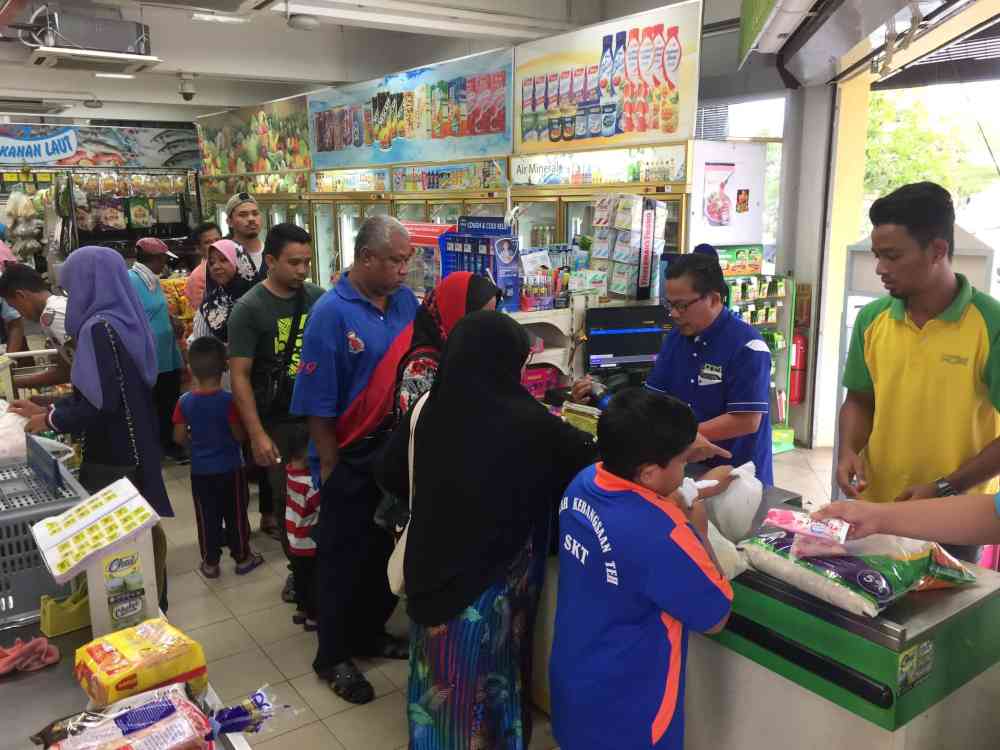Here’s how an anti-khat rally in Jerantut sparked a nationwide ‘buy Muslim first’ wave

“We all have WhatsApp. We know what is the sentiment being played on social media. It is not a campaign to buy products, but a campaign to boycott products”
(MMO) – A campaign for Malay-Muslims to buy products manufactured by or sold in shops owned by their fellow adherents have since courted backlash from Putrajaya and the traders’ community.
But the current wave had come as a retaliation to a protest against the teaching of khat calligraphy held in Jerantut ― a town nearly 200km away from Kuala Lumpur in Pahang, most commonly known as the gateway to the serene Taman Negara.
“We were sad and disappointed when the Chinese tried to protest against khat. That was the last straw,” Mohd Nor Izzat Mohd Johari, a teacher turned Malay rights activists based in Jerantut, told Malay Mail.
On August 20, a group of non-Malays reportedly gathered there to protest the teaching of the Malay-Arabic calligraphy in vernacular schools, with a banner saying: “We respect the diversity of religions, languages and cultures in Malaysia, but we protest making khat compulsory in SJK(C) syllabus.”
Izzat, who was allegedly sacked in 2014 for criticising the now-suspended School-Based Assessment system, explained that the idea for the campaign came as a way to divert the anger of Malay-Muslims in Jerantut.
“I feel the Chinese in Jerantut has ‘waged war’ against us. So, we will respond by not only calling for vernacular schools to be abolished, but to boycott Chinese shops in Jerantut!” he wrote that day on his popular Facebook page with nearly 22,000 likes.
“Boycott TF! Boycott TMG!” the activist known as Cikgu Izzat urged in his post, referring to TF Value Mart and TMG Mart, two chains of supermarket there perceived as being Chinese-owned.
“First warning: Do not go at all, do not step at all into Chinese supermarkets and shops for two days starting from August 21 until 23, 2019. We only shop at PDM Jerantut!” he added.
PDM refers to Pasaraya DarulMakmur, a chain operated by fully-owned by the Pahang Islam and Malay Culture Council with 10 stores across the state.
On the same day, he also lined out how fellow Muslims can join his boycott campaign, by either:
1. Shopping at Muslim stores and buying Muslim products, or
2. Shopping at Muslim stores, even if buying non-Muslim products, or
3. Buying Muslim products, even if shopping at non-Muslim stores.

He has since elaborated on the rationale behind such a move, saying that while non-Muslims may have received halal certification, they do not pay the “zakat”, or tithe, that would be redistributed to the Muslim community.
Claiming success in the first five days of his campaign, Izzat continued what he called “the first wave” until August 31.
“The goal of this campaign is awaress and an angry response to some Chinese in Jerantut who were rude and insolent by insulting Islam and the Malays. If the Chinese strike and rally, we Muslims and Malays will not retaliate as such, but we embark on an economic jihad,” he said, using the Arabic word that means “holy struggle”.
How things came together
Despite the recent wave, the campaign to buy “Muslim products” was actually first launched back in April by Malay-Muslim coalition Gerakan Pembela Ummah and its member Malaysia Muslim Consumers Association (PPIM), as a means to boost the businesses of entrepreneurs from the community.
“We hope through this campaign we can make our community aware, that it is enough that we make others rich. We have to make Muslims rich next,” Ummah chairman and Islamist group Ikatan Muslimin Malaysia (Isma) president Aminuddin Yahaya was quoted saying during the launch.
Izzat himself is one of those entrepreneurs, best known as a distributor for Chokee, a chocolate malt drink similar to the market leader Milo.
After his sacking, he had served as the press secretary to Datuk Seri Wan Junaidi Tunku Jaafar who was minister of natural resources and environment before the fall of Barisan Nasional, and Izzat most recently had unsuccessfully vied for the post of Umno Youth chief.
Notably, he is also an activist with PPIM and a member of the national Ummah secretariat. The campaign in April was his brainchild as the programme director.

